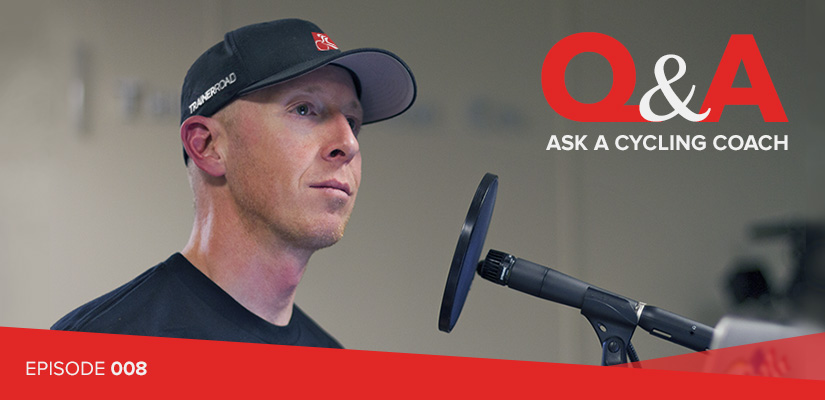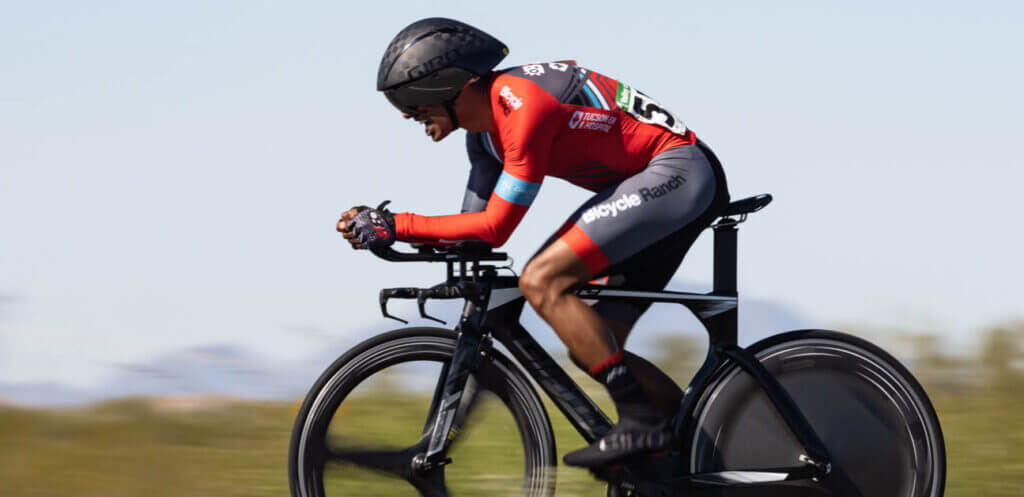Ask a Cycling Coach Podcast 008 – TrainerRoad Podcast

TrainerRoad’s Ask a Cycling Coach podcast is dedicated to making you a faster cyclist. It gives you the chance to get answers to your cycling and triathlon training questions with USAC certified coaches Chad Timmerman, Jonathan Lee and special guests. Check out a couple questions we answered in our latest episode.
Listen to the Full Episode
How do I become a faster climber?
It’s often assumed that cyclists who are fast climbers are born with a unique ability to climb well. But it’s actually much simpler than that. A fast climber is a cyclist who has a low weight relative to their power output and a well-developed muscular endurance.
While weight can be heavily influenced by genetics, maintaining a reasonable weight is manageable for the vast majority of cyclists. The other part of the equation is power output. The good news is that it’s very trainable. As your weight decreases, the forces of gravity will have less of an impact on your speed as you work to improve your ability to put out power. This is when your speed increases.
Muscular endurance, which is sometimes overlooked, is another factor to consider. Power output is often confused with force, but force is just one factor that’s considered in the equation to calculate power output. When a power meter calculates your power, it considers how hard you push the pedals (force) and how quickly you are turning the pedals (speed).
The steep and consistent nature of most climbs require a cyclist to be able to push hard on the pedals and keep them spinning for an extended duration. If you stop pedaling, you simply stop or begin to roll backwards, so there is no respite. Building this ability to put out high levels of power for uninterrupted periods of time is necessary for good climbing.
If you want to train to become a faster climber, yes, you can work on improving physical characteristics. There are a couple other things you can do as well. First, make sure your gearing is sufficient for the grades you will be climbing. Second, commit to consistently training in the position that you will be using on the climbs.
To hear the coaches’ advice on this topic, listen at 9:25.
Is it okay to use a TT bike on the trainer?
Although it may rank as one of the most #firstworldproblems you could face, a common concern cyclists have is which bike to use on the trainer. Cyclists have this question for good reason, their choice will greatly affect the outcome of their training.
A common rumor exists that cyclists should not use their carbon bikes on the trainer due to potentially damaging their frames. After facilitating countless hours of indoor training, we have yet to see a bike that was properly mounted to a trainer sustain any damage of the sort. It’s important to remember that while carbon fiber is light, it certainly isn’t weak.
When deciding which bike to use on the trainer, the most important thing to consider is which bike you will use during your goal event. Why does this matter? As you train, your ability to output power in a specific position will increase. To a certain respect, this muscular endurance is always position-dependent. So, although you may have gotten a professional bike fit on your mountain bike and road bike, chances are you’re in a very different position on each of those bikes. As a result, your ability to produce power may differ from bike to bike.
In addition to this, the gearing on your bike will have a profound impact on your training experience, especially if you have an electronic trainer. If you’re using TrainerRoad and have the luxury of an electronic trainer, the resistance will be automatically adjusted so you hit your power targets regardless of your current gear selection. Having said that, these trainers still have a flywheel weight — inertia definitely has an impact on the feel of the trainer.
If you’re a mountain biker preparing for a race with long, low-speed climbs that’ll see you in a 30/42 gearing combination, then training on your road bike in your big ring and 11-tooth cog is going to give you a totally different experience.
The golden rule (with question) is to train as you plan to race.
To hear the coaches’ advice on this topic, listen at 52:12.
Additional Notes
We answered a lot of questions in this week’s Ask a Cycling Coach podcast. You can learn more about these topics with our resources below:
- How to prepare for a cross-country marathon endurance mountain bike race
- How to train for a long distance time trial
- How to use high-intensity interval training for endurance racing
- How to pick the right base training plan
- How to compare data from a power meter to VirtualPower
- How does power output relate to heart rate
- How does bike fit affect power output
- How to find your FTP
- How to raise your FTP
- How much training volume should a road cyclist sustain
- How to prepare for a training camp or big block of training
If you have a question that you’d like to ask Coach Chad, submit your question here. We’ll do our best to answer them on the next episode of the Ask a Cycling Coach podcast.
